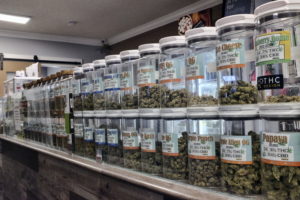Price hike coming with California’s new pot market

LOS ANGELES — California’s legal marijuana marketplace is coming with a kaleidoscope of new taxes and fees that could influence where it’s grown, how pot cookies and other munchies are produced and the price tag on just about everything.
Be ready for sticker shock.
On a retail level, it costs about $35 to buy a small bag of good quality medical marijuana in Los Angeles, enough to roll five or six joints.
But in 2018, when legal sales take hold and additional taxes kick in, the cost of that same purchase in the new recreational market is expected to increase at the retail counter to $50 or $60.
At the high end, that’s about a 70 percent jump.
Medical pot purchases are expected to rise in cost too, but not as steeply, industry experts say.
Or consider cannabis leaves, a sort of bottom-shelf product that comes from trimming prized plant buds. The loose, snipped leaves are typically gathered up and processed for use in cannabis-laced foods, ointments, concentrates and candies.
Growers sell a trash bag stuffed with clippings to manufacturers for about $50. But come January, the state will tax those leaves at $44 a pound.
That means the tax payment on a bag holding 7 or 8 pounds would exceed the current market price by five or six times, forcing a huge price hike or, more likely, rendering it essentially valueless.
“All it would become is compost,” predicted Ryan Jennemann of THC Design in Los Angeles, whose company has used the leaves to manufacture concentrated oils.
Governments struggling to keep up with the cost of everything from worker pensions to paving streets are eager for the cascade of new tax money from commercial pot sales that could eventually top $1 billion statewide.
But higher taxes for businesses and consumers give the state’s thriving illicit market a built-in advantage. Operators in the legal market have been urging regulators to be aggressive about shutting down rogue operators.
Market advantage
Donnie Anderson, a Los Angeles medical cultivator and retailer, predicted the higher level of state taxation next year is “just going to help the illicit market thrive.” He said more needs to be done to cut the cost, especially for medical users, many of whom won’t be able to absorb a price jump.
The increased tax rates are just one part of California’s sprawling plan to transform its long-standing medical and illegal markets into a multibillion-dollar regulated economy, the nation’s largest legal pot shop.
